United Family Healthcare prides itself on our commitment to patients and their families to maintain the highest standards of quality in health care. Globally, nurses are playing an ever greater role in the future of medicine. The strength of our nursing team at UFH stands out as an important factor in the quality of care we provide to our patients. Our primary mission is to consistently deliver safe, high–quality, culturally-sensitive nursing care with professionalism, compassion and pride in our work. As Chief Nursing Officer, I am proud of the dedication our nurses make to improve the quality of care for each and every one of our patients and their families.
While most hospitals in China continue to implement task-oriented nursing as their model of care, UFH has adopted the nursing-process model to ensure the delivery of holistic, patient-focused care. The advantages of this model guarantee that the care patients receive is thoroughly planned, meets their individual and specific needs and provides a continuity of care. The ratio of one nurse for every three to four patients enables the successful delivery of planned care in a safe environment. We pride ourselves on the fact that our uncompromising standards of care greatly exceed local health bureau standards .
In all nursing and care-giving settings throughout our network, we deliver quality care in a family service-oriented environment. Known as the “4C’s of care,” our nurses strongly believe in the values of confidence, caring, comfort, and convenience to improve care. Other tools we use to enhance patient satisfaction include hourly rounding for inpatient care, allowing us to carefully listen to patients, drilling down issues and personalizing their care. Additionally, all our nurses system-wide follow a simple communications tool known as‘AIDET,’ which stems from our overall patient-centered philosophy. AIDET guides nurses to Acknowledge patients, clearly Introduce themselves, talk about the Duration of how long each encounter or procedure will take, Explain in detail what will happen, and Thank the visitor at the end. Together these values, systems and tools assist us in providing our uniquely diverse patient population speaking multiple native languages with the premium, individualized care they deserve.
As part of UFH’s efforts in fostering evidence-based clinical culture, we focus on enhancing our evidence-based nursing practices. Evidence-based nursing requires the integration of individual clinical expertise and patient preferences with the best external clinical evidence available to make better decisions on the care of individual patients or groups. To enhance our nurses’ clinical knowledge and competencies, we established an advanced simulation training environment. Additionally, our staff takes part in nursing conferences, seminars and web courses, as well as a nursing journal club in which they can share and discuss new research and advances in the nursing field.
Our nursing staff is highly experienced in a variety of clinical settings. A majority of our team members have obtained advanced nursing education, and many continue to pursue further training in order to better serve their patients and advance their careers. While we value our nursing staff’s further education, we equally value their clinical expertise. UFH nurses achieve an advanced level of competency in providing safe, quality care, but rather than simply ending their career as a professional nurse, we encourage them to further specialize within the clinical setting. While some choose to become nurse educators, others focus on leadership roles, nursing informatics, or specialist training. As a nursing leader, I am particularly proud of the career pathways we provide for our nurses, especially since specialized nursing still remains a nascent concept in China today.
Professionalism in nursing adds tremendous value and worth to the nursing profession, which is hailed as one of the most rewarding jobs in the world. The quality of the practice environment at UFH supports this professionalism. Our nurses have the autonomy to make decisions within the scope of nursing services, giving them a voice in developing evidence-based practices. This results in better outcomes for our patients.
The current health care environment presents special challenges to the nursing profession. With the addition of cultural diversity and language needs, UFH nurses are confronted with even greater challenges in meeting our ultimate goals. I would like to thank our dedicated team of nurses for the outstanding work they consistently provide, their mentoring of new staff, the pride they take in our profession, their advocacy on behalf of our patients and the legacy of excellence they uphold in treating you.
Shen Xiaoyan, RN
Vice President for Nursing Affairs
United Family Healthcare









